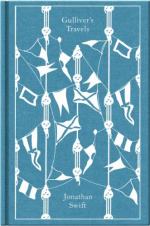|
This section contains 8,371 words (approx. 28 pages at 300 words per page) |

|
SOURCE: "The Brainwashing of Lemuel Gulliver," in The Southern Review, Vol. 32, No. 1, Winter, 1996, pp. 128-46.
Below, Donoghue discusses ways in which Swift challenged Enlightenment thought and mocked Locke's "tabula rasa" conception of human consciousness, and instead viewed men as destined to be "brainwashed" by ineluctable cultural, political, and social forces.
On October 28, 1726, the London printer Benjamin Motte issued the first volume of Travels into Several Remote Nations of the World by Lemuel Gulliver, "first a surgeon, and then a captain of several ships." A few readers knew that the real author was Jonathan Swift, Dean of St. Patrick's Cathedral—"the cathedral close"—in Dublin. Presumably they took the book as a squib, a throwaway from the Dean's official life or a satire on those in power in London who had banished him to the wilderness of Dublin in 1714. The book was an immediate success: two further editions were...
|
This section contains 8,371 words (approx. 28 pages at 300 words per page) |

|


